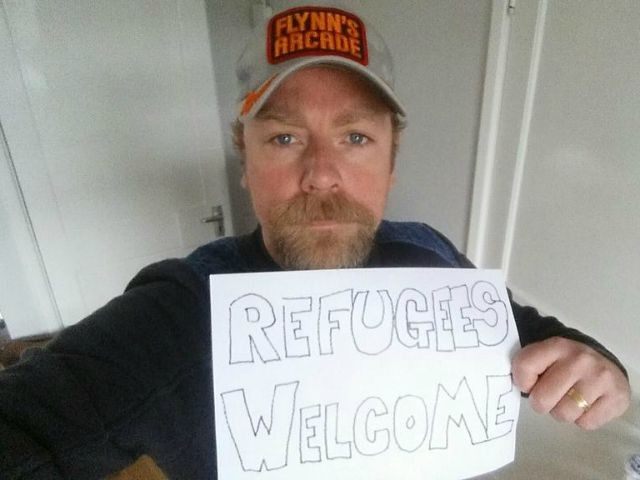Journalist and author Peter Hitchens has been exposing the hypocrisy and cant of “posturing notables” regarding the refugee crisis. In most recent column for the Mail on Sunday he warns against the fundamental transformation of Britain sought by those seeking to welcome all migrants.
He opens by explaining that having inherited Britain from others, “we have a duty to hand it on to our children and grandchildren, preferably improved and certainly undamaged.” He describes this as “one of the heaviest responsibilities we will ever have,” advising that we cannot just give it away on impulse in the face of the refugee crisis to make us “feel good about ourselves.”
Typically, he does not just leave the matter there. He calls out those whose response to the refugee crisis is to make grand gestures of support with little to back them up – or “compassion signalling” as Breitbart London‘s James Delingpole described it earlier this week. He writes:
“Every one of the posturing notables simpering ‘refugees welcome’ [such as comedian Rufus Hound pictured above] should be asked if he or she will take a refugee family into his or her home for an indefinite period, and pay for their food, medical treatment and education.
“If so, they mean it. If not, they are merely demanding that others pay and make room so that they can experience a self-righteous glow. No doubt the same people are also sentimental enthusiasts for the ‘living wage’, and ‘social housing’, when in fact open borders are steadily pushing wages down and housing costs up.
“As William Blake rightly said: ‘He who would do good to another must do it in minute particulars. General good is the plea of the scoundrel, hypocrite and flatterer.’”
Hitchens goes on to credit Britain being an island state for the reason it is a desirable place to live pointing out “most of the really successful civilisations survived because they were protected from invasion by mountains, sea, deserts or a combination of these things.” He notes this has led to the development of “astonishing levels of trust, safety and freedom” in Britain which, albeit to a lesser extent, can also be seen in the Anglosphere countries of the USA, Canada, Australia and New Zealand.
He is, therefore, all the more amazed at the willingness of some to give all that away. He writes:
“Our advantages depend very much on our shared past, our inherited traditions, habits and memories. Newcomers can learn them, but only if they come in small enough numbers. Mass immigration means we adapt to them, when they should be adapting to us.
“So now, on the basis of an emotional spasm, dressed up as civilisation and generosity, are we going to say that we abandon this legacy and decline our obligation to pass it on, like the enfeebled, wastrel heirs of an ancient inheritance letting the great house and the estate go to ruin?”
Hitchens also writes about the major turning point of the refugee crisis, the publication this week of the photograph of 3-year-old Aylan Kurdi’s drowned body lying on a beach. In doing so he rejects the viewpoint of many of his colleagues in the mainstream media, writing:
“Having seen more than my share of real corpses, and watched children starving to death in a Somali famine, I am not unmoved by pictures of a dead child on a Turkish beach. But I am not going to pretend to be more upset than anyone else. Nor am I going to suddenly stop thinking, as so many people in the media and politics appear to have done.
“The child is not dead because advanced countries have immigration laws. The child is dead because criminal traffickers cynically risked the lives of their victims in pursuit of money.
“I’ll go further. The use of words such as ‘desperate’ is quite wrong in this case. The child’s family were safe in Turkey. Turkey (for all its many faults) is a member of Nato, officially classified as free and democratic. Many British people actually pay good money to go on holiday to the very beach where the child’s body was washed up.
“It may not be ideal, but the definition of a refugee is that he is fleeing from danger, not fleeing towards a higher standard of living.”
He goes on to explain that he has always vocally opposed the armed interventions by the West in Syria and Libya, but sees “neither sense nor justice in allowing these things to become a pretext for an unstoppable demographic revolution in which Europe (including, alas, our islands) merges its culture and its economy with North Africa and the Middle East.” There, Hitchens predicts, lies the loss of all that actually makes others want to live here.
After questioning the veracity of the migrants (“You really think these crowds of tough young men chanting ‘Germany!’ in the heart of Budapest are ‘asylum-seekers’ or ‘refugees’?”) he concludes pessimistically:
“Can we stop this transformation of all we have and are? I doubt it. To do so would involve the grim-faced determination of Australia, making it plain in every way that our doors are open only to limited numbers of people, chosen by us, enduring the righteous scorn of the supposedly enlightened.
“As we lack the survival instinct and the determination necessary, and as so many of our most influential people are set on committing a sentimental national suicide, I suspect we won’t.
“To those who condemn reasonable calls for national self-defence as bigotry, hatred and intolerance (which they are not), I make only this request: just don’t pretend you’re doing a good and generous thing, when you’re really cowardly and weak.”

COMMENTS
Please let us know if you're having issues with commenting.